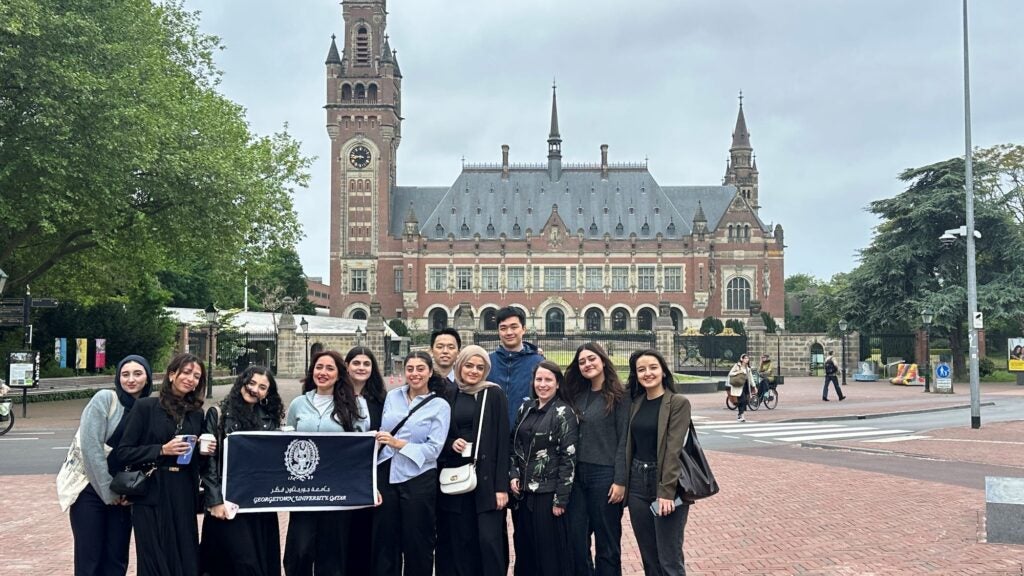Inside International Justice: GU-Q Students Experience The Hague Firsthand

In a pioneering experiential learning course offered by Georgetown University in Qatar (GU-Q), twelve students recently traveled to The Hague, Netherlands, known as a hub of global law, to explore international justice up close. The new course, “The Hague, International Law, and Justice: Institutions, Civil Society and Academia,” was developed and led by Dr. Noha Aboueldahab, Assistant Professor of International Law, and brought students face-to-face with institutions at the core of global law and accountability.
For rising senior Bayan Kayali, who is majoring in International Politics, the trip was an important chance to see the inner workings of the international legal system in action. “I gained invaluable insights about international law and justice that went far beyond what can be taught in a lecture hall,” she shared. Aspiring lawyer Justin Pacer, from the Class of 2026, agreed, saying: “It was truly one of the most formative academic experiences I’ve had.”
Over the span of seven days, students visited 13 institutions and engaged with nearly 25 professionals and academics from bodies such as the International Criminal Court, the International Court of Justice, the Organisation for the Prohibition of Chemical Weapons, and the UN Residual Mechanism for Criminal Tribunals. The course also included meetings with Dutch diplomats, legal advocates, and faculty from partner universities.
For several students, the trip was their last chance to gain real-world experience before graduation. “I’m so grateful for the chance to learn from so many amazing practitioners, it was the perfect way to wrap up my undergrad journey,” shared International History major Natali Fanik. “What this trip gave me was a deeply human connection to the material. Studying human rights litigation in theory doesn’t capture what sitting with someone who spends every day trying to make it work in impossible circumstances.”
Her classmate Areesha Fatima, who studied International Economics with a minor in Justice and Peace Studies reiterated how meaningful this experience was, saying: “It was easily one of the most enriching experiences I have had at Georgetown. Standing inside the institutions I have studied for years and speaking with the people who run them made me realize that a career in international justice is not just a distant dream. It helped me to envision my own place in these institutions and I can’t think of a better way to end my undergraduate degree.”
Aspiring lawyer Kiyoun Lee (SFS’25) shared: “When I am in law school, I will now have the bragging rights to say I went to the ICC, ICJ, and have met with professionals. Actually going to the institutions and places offered me this new impression of how real all this is, and it is not something that could be realized in classrooms.”
The students’ thoughtful engagement left a lasting impression on their hosts, including Senior Public Prosecutor Jolanda de Boer from the Netherlands National Public Prosecutors’ Office, who commented: “The questions the students asked… were proof of their great commitment to and knowledge of international law. I was genuinely impressed.”
The Embassy of the Netherlands to Qatar also played a critical role in the success of the trip, providing suggestions and connections on the ground, including Ambassador Ferdinand Lahnstein, and Ilyaas Sherally, former head of political affairs at the embassy. “It was a pleasure to support such a meaningful visit and a privilege to engage with such driven and sharp students. In times as unsettling and troubling as these, not least with the man-made catastrophe in Gaza, the importance of International Law and Justice cannot be overstated,” commented Sherally.
“No words can adequately describe the thrill of teaching this new experiential learning course,” said Dr. Aboueldahab, thanking her colleagues and trip co-organizers Angela Marongiu and Dr. Rowan Ellis. “I’m deeply grateful to all those who took the time out of their busy schedules to engage, and especially to the amazing students who made this course special with their critical and constructive reflections.”
Students shared those reflections in final assignments submitted at the end of class, such as this excerpt from Justin Pacer’s ePortfolio. “I leave this trip with a much deeper sense of responsibility, empathy, and understanding. A responsibility to not just critique from a distance, but to engage. A responsibility to carry forward the labor of those who are working, often unseen, to move justice forward. And most of all, a responsibility to give back. To use what I’ve learned not just to write better papers, but to stand for something.”
Now celebrating two decades in Qatar, this course is a powerful example of GU-Q’s commitment to bridging classroom theory with real-world insight—equipping students with firsthand exposure to the complexities of global justice.